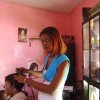The thing is that people who are poor don't exactly have any collateral to offer in exchange for a bank loan. Providing proof of steady employment and a verifiable credit history are pretty much impossible for a woman with a family in a small village in Africa, so how can she be expected to apply for traditional credit to start her own business? Just the interest rates alone may sink her. And interest rates applied to the developing world by our developed world are a huge part of the reason that our brothers and sisters in developing countries are so far behind us in their standard of living.
There are those who question charging interest at all... but after years and years of sending donations to people in the developing world, we are realizing that free money creates an unhealthy imbalance between donor and recipient. Giving a loan at an interest rate that is easily repaid, however, allows for both sides to feel good about their efforts. Muhammad Yunus, founder of the Grameen Bank in India, understood that people feel better when they repay a loan rather than receive charity. He received a Nobel Peace Prize in 2006 for his pioneering efforts in microfinance, and the award brought his work into the limelight -- after he'd been at it for 30 years! He began in 1976, lending small amounts of his own money at low interest to help rural people start their own businesses. 35 years later, there are many organizations that do the same. My girlfriend's sister started Shanti Microfinance, a successful organization in the UK that encourages socially conscious technology companies to invest in the small businesses of people in Gujarat province in India.
My own experience has been through www.kiva.org. In 2009, a friend gave my daughters each $25 for Christmas to invest through Kiva. We looked at the website and made loans to three different people -- a hairdresser in Senegal, a would-be shop owner in Togo, and a seamstress in Uganda. By the following Christmas, the loans had been repaid, and the girls reinvested in people in Azerbaijan, Ghana, and Pakistan. What's really neat is that we can track the progress of our entrepreneurs online. If all goes well, we'll be repaid again by Christmas this year.
Here's our successful hairdresser friend.
What I really like is that we're not sending money away and never hearing whether our donation made a difference. We can see that it did, and that makes us want to continue our microfinance efforts.
If you're interested in giving an entrepreneur in the developing world a low-interest loan, there are many organizations with whom to work. Here are just a few:
www.care.org (Care -- "Fighting Poverty, Defending Dignity")
www.swwb.org (Women's World Banking -- "Investing in Women, Transforming Lives")
www.kiva.org ("Empower people around the world with a $25 loan")
I'll add more as I discover them, or if you know of others, let me know. In the meantime, happy lending!


THANK YOU!! I have heard of these and I saw a PBS special on these micro loans specifically for women. I have thought about getting involved in this because it seems like such an amazing idea with real results. Thank you for the reminder!!!!
ReplyDelete